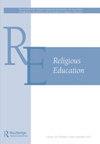宗教教育者与变革
IF 0.4
3区 哲学
0 RELIGION
引用次数: 0
摘要
摘要作为管理者的宗教教育者能成为更好的变革推动者吗?随着越来越多的宗教教育工作者进入神学高等教育的管理岗位,本文对宗教教育工作者及其变化进行了探讨。本文首先考察了宗教教育及其目的。然后,它提出了不同的变革理论,并随后提出了问题,因为文章认为社区是有色人种宗教教育者和女性宗教教育者变革的基础。文章继续通过引入隐喻来谈论宗教教育者,并总结了为什么宗教教育者在行政管理中呈现出一种有说服力的变革可能性。关键词:宗教教育管理变革社区宗教教育披露声明作者未报告潜在利益冲突。声明与声明作者没有与本文内容相关的竞争利益需要声明。注1:我承认宗教教育和基督教教育之间存在差异,特别是在内容、教学方法和权威来源方面。然而,像基督教教育这样特殊的东西的整体概念、机制和结构,属于对宗教教育更广泛的理解。其他资料投稿人备注mark Chung Hearn mark Chung Hearn是美国加州伯克利太平洋教会神学院教务主任。电子邮件:mhearn@cdsp.edu本文章由计算机程序翻译,如有差异,请以英文原文为准。
Religious Educators and Change
AbstractDo religious educators as administrators make for better agents of change? As more religious educators come into administrative positions in theological higher education, this article probes the religious educator and change. The article begins by examining religious education and its aims. It then offers different change theories and subsequently problematizes them as the article argues that community is foundational to change for religious educators of color and female religious educators. The article continues by introducing metaphors to speak of the religious educator and concludes with reflections as to why religious educators in administration present a persuasive possibility for change.Keywords: Religious educatoradministrationchangecommunityreligious education Disclosure statementNo potential conflict of interest was reported by the author.Statement and declarationThe author has no competing interests to declare that are relevant to the content of this article.Notes1 I acknowledge there are differences between religious education and Christian education, particularly in content, pedagogy, and sources of authority. However, the overall concept, mechanisms, and structures of something as particular as Christian education fall under the broader understanding of religious education.Additional informationNotes on contributorsMark Chung HearnMark Chung Hearn is Dean of Academic Affairs at Church Divinity School of the Pacific in Berkeley, CA, USA. E-mail: mhearn@cdsp.edu
求助全文
通过发布文献求助,成功后即可免费获取论文全文。
去求助
来源期刊

RELIGIOUS EDUCATION
RELIGION-
CiteScore
0.90
自引率
28.60%
发文量
46
期刊介绍:
Religious Education, the journal of the Religious Education Association: An Association of Professors, Practitioners, and Researchers in Religious Education, offers an interfaith forum for exploring religious identity, formation, and education in faith communities, academic disciplines and institutions, and public life and the global community.
 求助内容:
求助内容: 应助结果提醒方式:
应助结果提醒方式:


